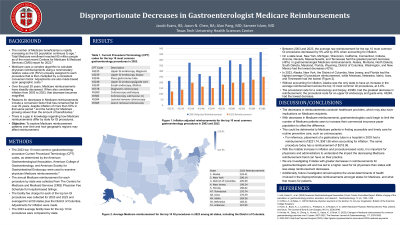Sunday Poster Session
Category: Practice Management
P1200 - Disproportionate Decreases in Gastroenterologist Medicare Reimbursements
Sunday, October 22, 2023
3:30 PM - 7:00 PM PT
Location: Exhibit Hall

Has Audio
- JE
Jacob T. Evans, BS
Texas Tech University Health Sciences Center, TX
Presenting Author(s)
Jacob T. Evans, BS, Jason N. Chen, BA, Alan Pang, MD, Sameer Islam, MD, MBA
Texas Tech University Health Sciences Center, Lubbock, TX
Introduction: Medicare provides support for an increasing number of patients, but as the patient base has grown, the reimbursements for physicians have decreased. With the proportion of aging adults increasing, and with routine gastroenterological (GI) procedures occurring more frequently in older populations, reimbursements have dropped significantly, especially when confounded with factors including high inflation, COVID-19 safety precautions, and higher staffing costs. The purpose of this investigation is to explore reimbursement patterns over time and how demographic variations may affect reimbursement.
Methods: We used the Centers for Medicare and Medicaid Services Physician Fee Schedule to examine the annual average national and individual state reimbursement for both hospitals and outpatient clinics for the top 10 most common gastroenterology procedures as determined by the American Gastroenterological Association. For each of the procedures, we calculated the inflation adjusted percent change in reimbursement over 20 years for the aggregate facility and non-facility fees limiting charge. This was compared among each state in the US.
Results: On average, the reimbursements for GI procedures have decreased, often before inflation adjustments. For an esophageal biopsy, the limiting reimbursements in 2006 for a hospital and physcian’s office were $169.39 and $355.71, respectively. Inflation adjustment yields $254.89 and $535.26, respectively. In 2023, the same limiting reimbursements for an esophageal biopsy were $150.31 and $419.83, representing 41% hospital and 32% physician's office decrease. On a state level, the changes in reimbursements have not been equal, which may be influenced by demographic variations like race and ethnicity. For instance, facility and non-facility limiting charges between 2013 and 2023 for an esophageal biopsy decreased by 43% and 24% in Missouri, with an African American population of 11.8%, and by 40% and 18% in Montana, with an African American population of 0.6%.
Discussion: While the decreases in reimbursements constrain healthcare providers, they are also detrimental to patients who rely on Medicare coverage. With higher decreases in Medicare reimbursements, gastroenterologists may begin to limit the number of Medicare patients seen. Additionally, the disproportionate decreases in reimbursements among states, especially in those with higher minority populations, contributes to the lack of care for already marginalized groups.
Disclosures:
Jacob T. Evans, BS, Jason N. Chen, BA, Alan Pang, MD, Sameer Islam, MD, MBA. P1200 - Disproportionate Decreases in Gastroenterologist Medicare Reimbursements, ACG 2023 Annual Scientific Meeting Abstracts. Vancouver, BC, Canada: American College of Gastroenterology.
Texas Tech University Health Sciences Center, Lubbock, TX
Introduction: Medicare provides support for an increasing number of patients, but as the patient base has grown, the reimbursements for physicians have decreased. With the proportion of aging adults increasing, and with routine gastroenterological (GI) procedures occurring more frequently in older populations, reimbursements have dropped significantly, especially when confounded with factors including high inflation, COVID-19 safety precautions, and higher staffing costs. The purpose of this investigation is to explore reimbursement patterns over time and how demographic variations may affect reimbursement.
Methods: We used the Centers for Medicare and Medicaid Services Physician Fee Schedule to examine the annual average national and individual state reimbursement for both hospitals and outpatient clinics for the top 10 most common gastroenterology procedures as determined by the American Gastroenterological Association. For each of the procedures, we calculated the inflation adjusted percent change in reimbursement over 20 years for the aggregate facility and non-facility fees limiting charge. This was compared among each state in the US.
Results: On average, the reimbursements for GI procedures have decreased, often before inflation adjustments. For an esophageal biopsy, the limiting reimbursements in 2006 for a hospital and physcian’s office were $169.39 and $355.71, respectively. Inflation adjustment yields $254.89 and $535.26, respectively. In 2023, the same limiting reimbursements for an esophageal biopsy were $150.31 and $419.83, representing 41% hospital and 32% physician's office decrease. On a state level, the changes in reimbursements have not been equal, which may be influenced by demographic variations like race and ethnicity. For instance, facility and non-facility limiting charges between 2013 and 2023 for an esophageal biopsy decreased by 43% and 24% in Missouri, with an African American population of 11.8%, and by 40% and 18% in Montana, with an African American population of 0.6%.
Discussion: While the decreases in reimbursements constrain healthcare providers, they are also detrimental to patients who rely on Medicare coverage. With higher decreases in Medicare reimbursements, gastroenterologists may begin to limit the number of Medicare patients seen. Additionally, the disproportionate decreases in reimbursements among states, especially in those with higher minority populations, contributes to the lack of care for already marginalized groups.
Disclosures:
Jacob Evans indicated no relevant financial relationships.
Jason Chen indicated no relevant financial relationships.
Alan Pang indicated no relevant financial relationships.
Sameer Islam indicated no relevant financial relationships.
Jacob T. Evans, BS, Jason N. Chen, BA, Alan Pang, MD, Sameer Islam, MD, MBA. P1200 - Disproportionate Decreases in Gastroenterologist Medicare Reimbursements, ACG 2023 Annual Scientific Meeting Abstracts. Vancouver, BC, Canada: American College of Gastroenterology.
